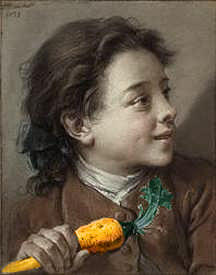9.14.2007
 Liveblogging 2.0 at the Revolution. I'll be updating this post with info and comments from the conference.
Liveblogging 2.0 at the Revolution. I'll be updating this post with info and comments from the conference.
Friday 3:55 PM: Its pretty exciting to have all of our participants and speakers slowly start to make their way into the conference. I have to admit though, that I'm almost as excited to watch my logo go up the side of the building on the gigantic banner. Had lunch with a bunch of the presenters today, and talked to Sheryl Nussbaum-Beach about coordinating a collaborative video project between a some schools around the world. I found out that my presentation was in direct conflict with a Second Life presentation by Chris Smith that I was looking forward to- but I knew I wouldn't be able to do everything...
Friday 6:42 PM: We're off to a great start (everyone enjoyed dinner), and our opening session is just beginning. I've been assigned a student to help me throughout the weekend, so I stuck a video camera in his hand, and he'll be uploading video of our conference to our ning site. Check it out, I expect to get some highlights online late tonight or early tomorrow morning.
7:00-8:30: Here are some notes from our opening session - I was running around in the begining and missed a few of our speakers. The following are notes that I've taken, and should NOT be misconstrued as direct quotes, and hey, I might have even gotten something totally wrong...
Laurie Heikkela: With all the freeware, shareware, open source, now is the time to explore and utilize what is available, and use those to our advantage to save money as we
Jamie McKenzie: "Security" is a fear word today, and is being misused. We're living in a time when words are being used to control us, and we need to take back our vocabulary and reinstall security.
Alan November: Schools take technology and jam it into the box that schools are in. The question is "Who should earn the learning", and as long as schools contain the learning, "learning 2.0" can't work. For web 2.0 to work in schools, there needs to be a major shift in thinking that we're decades away from.
Sheryl Nussbaum-Beach: We are on the edge of a change, web 2.0 can bring a transparency into schools, and allow people to connect and collaborate on a global scale.
Chris Smith: Theres a big digital divide in Asia. International schools have an overload of techology and in some local schools some teachers haven't even touched a keyboard- we're educating students for a future that we don't know what it will be. Second life is changing the playing field, because when you go there, everyone is equal.
Wes Freyer: Group 1: knowledge is contained and delivered, Group 2: Knowledge is constructed. Web 2.0 won't force Learning 2.0 to happen. In traditional learning, we emphasize fast answers. Learning 2.0 comes about when we blend instruction, when we create an environment. We're connecting to people that we couldn't connect to otherwise. Marco Torres has a good quote - "Who are your Yodas"? From across the world we have the ability to be connected on an ideological level, and this is more powerful than learning in a closed environment in schools.
S N-B: On Authentic relationships in Web 2.0- when students interact on a different level, for example blogging, they get to be known through their ideas and creativity. You'll often see shy kids connecting with larger groups as they meet first through exchanging ideas.
J McK: Some bloggers write amazing articles, some waste your time with inconsequential activities, and we should be encouraging students not just to blog, but to think about what they're writing about.
AN: My son is well connected through the internet, and there are more 'friends i' on his blog than i know in real life. This is the first generation of teachers that don't understand the games kids play- not understanding that is a major loss in understanding the way that they engage the world. Playing has a lot to do with self-actualizing. Knowing how they play means knowing how they make connections and construct ideas. Every classroom should be a global communications center. That takes a major shift. We need to redefine teachers, learners, and even families. Every 500 years we invent a disruptive technology. We'll destroy school as we know it... or not.
JMcK: I dismiss the idea of students as "digital natives" being some kind of higher status from those that came before and having a different kind of knowledge - it is disrespectful.
WF: We need to avoid a monolithic void of web 2.0. Most tools given to teachers are fairly fixed. Pencil, paper, computer are protean. My Space is a different space than Class Blogmeister. Differentiation: give students the opportunity to learn in different way. Have students create content and knowledge in different ways. Kids are creating content NOT just for a grade, but because there are other people out there listening and watching. Meaningfulness comes from connectedness.
LH: Think about the citizen that you want to educate and influence the world one day. Will the technologies we discuss meet your goals?
J McK: How can web 2.0 help with some of the work that we're doing in making our students better readers and writers, critical thinkers?
S N-B: The party has started, do we want to go? The students are using these tools, can we help them use them constructively in becoming better citizens?
CS: When we're talking about leanring change, its like the quest for fire. What ingredients you choose is directly related to what food you want to serve. What are your learning objectives?
WS: Learning 2.0 - WE need to understand how our kids are learning, how they are communicating. Look at your own learning practice and find an entry point.














